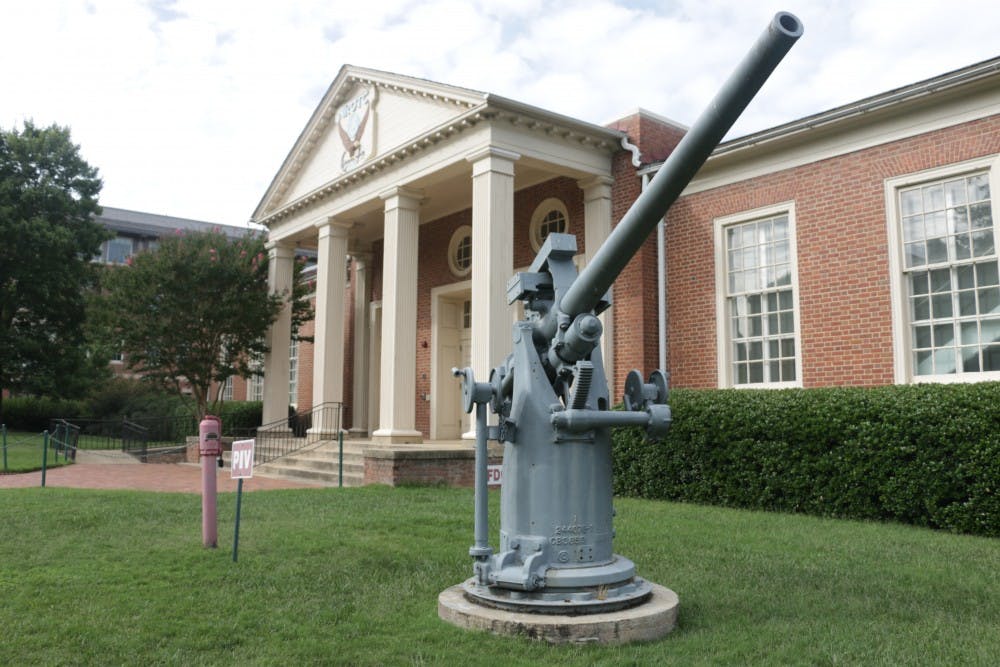In March 1995, Causey’s hard work paid off and UNC got an Army ROTC program. By that August, cadet enrollment at UNC was higher than ROTC programs at Duke or North Carolina Central University.
Causey, who retired in the area, will celebrate 50 years as a UNC graduate in May 2018.
Before being a Cadet
Some students participate in JROTC in high school, but many don’t start until college.
“I actually joined my second semester freshman year of college,” junior Joanna Kassimis said. “I didn’t know it was something I wanted to do coming into college.”
After going to events and morning workouts, Tina Marie Capelo, a 2017 graduate, joined ROTC the spring of her sophomore year.
“I wanted to find my niche,” she said. “ I hadn’t really found that yet. I looked at a couple sororities and I sort of wanted that comradeship that you get when you belong in a group.”
Many high school students apply for ROTC scholarships, which cover the cost of room and board or tuition at any school with an ROTC program, Doolan said.
Scholarship recipients commit to serving four years of Active Duty and another four years in the Individual Ready Reserve.
About 40 of UNC’s 60 ROTC participants receive scholarships, which are granted after an application review and interview. He said academic performance and character are major considerations.
In addition to the scholarship, cadets receive a monthly stipend between $300 and $500, which increases by year.
Barnes said cadets can get recruited for a scholarship while being a UNC student with two years of schooling left. But he said there are even ways around that two-year limitation.
To get the day's news and headlines in your inbox each morning, sign up for our email newsletters.
Being a Cadet
While many UNC students avoid 8 a.m. classes, cadets wake up at 5 a.m. for their workout regimen.
From 6 a.m. to 7:15 a.m. three times a week, ROTC students have physical training. The early morning routine includes running, circuits and a full body workout.
“Research has shown that if you start your day doing some type of physical activity, it sets you up for success later in the day,” Barnes said.
He said he tries to treat the cadets like real athletes when it comes to exercise.
ROTC requires leadership classes on ethics, finances, communications and time management, among other skills. First-year classes focus on individual wellness, land navigation and outdoor survival, while sophomore and junior classes concentrate on weapons and navigation. Seniors focus on how to be officers by organizing and leading other ROTC students.
First-years are required to take one credit each semester, while sophomores take a two-hour credit and juniors and seniors take three hours.
“We want to give them tools to be successful wherever they go, so that’s why we challenge their creative thinking (and) how to communicate with others,” Barnes said. “Empathy is a big one that we harp on.”
On Wednesdays, cadets have a leadership lab at Forest Theatre, where the students practice military missions, tactics and maneuvers, such as a platoon or swat.
“Almost every other weekend we have some kind of volunteer event, whether that be a blood drive or a food drive or Habitat for Humanity,” Capelo said.
Once a semester, cadets are required to attend the Field Training Exercises at Camp Butner, where they learn how to survive in the outdoors, perform tactical exercises and complete obstacle courses.
“The ROTC program itself is really encouraging graduation, so we really try not to impact the student’s ability to accomplish their academic goals,” Doolan said.
He said many of the cadets are involved in student organizations and activities. Kassimis said that through the ROTC program, students learn to make an impact on different groups of people.
“It’s not necessarily just being a good soldier, but being a good person and having strong moral values and furthering that within an organization,” she said.
For the summer, the cadets can intern with federal agencies or join abroad programs. Cultural Understanding and Language Proficiency is a program that allows ROTC students to be culturally immersed in foreign countries such as Peru, Cambodia and Bulgaria.
Cadet Troop Leader Training provides ROTC students leadership positions within active duty units in places such as Germany, Hawaii and Colorado.
The program also creates strong relationships between the cadre and cadets through emotional and moral support.
“We’ve got a very good relationship with the cadets,” Barnes said. “I’ve probably helped most of them out, I’d say like 85 percent, with their personal issues.”
Capelo said the ROTC program helps people improve skills and mentality without them even noticing.
“Your public speaking becomes better because you just have to do it,” she said. “You’re working out and it sucks and you want to complain, but you learn not to.”
She said the ROTC program provides guidance on how to be a good and compassionate leader.
After being a Cadet
“I really do just like the aspect of getting to serve your country, and it has a lot of cool opportunities,” Kassimis said. “I think a lot of people underestimate how many jobs the Army and military in general have to offer.”
Kassimis said as a medicine student, ROTC has opportunities to further education and career goals.
“I chose the Guard, which is the Reserves,” Capelo said. “I’m the recruiting officer full time for just the summer and then I have to attend a little more training.”
Capelo said she couldn’t imagine her college experience without ROTC.
“There’s no better feeling in the world that your best friend or the guy to the left or right — or girl — would be willing to take a bullet for you,” she said.
university@dailytarheel.com



